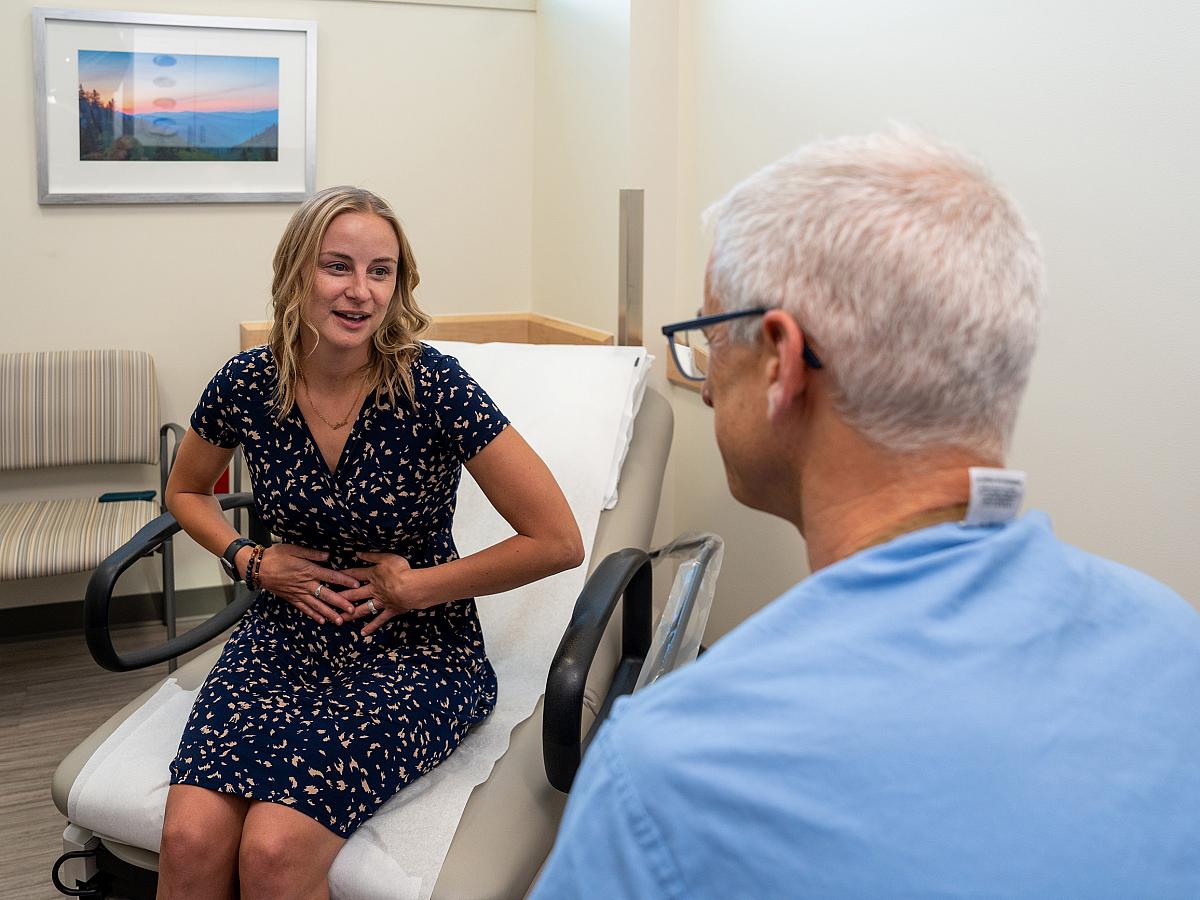
What Is Hormone Replacement Therapy?
Hormone replacement therapy (HRT) balances a woman’s hormones as she nears or enters menopause. During menopause, the hormones estrogen and progesterone, which regulate the female reproductive system, naturally decrease. Women stop having menstrual cycles (periods) and can no longer have children. The average age of menopause for women in the US is 51.
How Does Hormone Therapy Work?
HRT is medication that replaces the estrogen and progesterone your body has stopped making naturally. It may take several weeks to see results once you start taking hormones.
University of Utah Health’s Women’s Health providers are committed to helping you feel your best during this transition. If menopause symptoms are interfering with your qualify of life, you can find help at our Midlife Women’s Health and Menopause Program.
Types of Hormone Replacement Therapy
There are several types of hormone therapy for women.
- Oral hormones are taken as a pill. Your provider will tell you how often and the best time of day to take the pills.
- Patches allow your body to absorb hormones through your skin. You’ll replace the patch once or twice per week.
- Estrogen-only HRT is for women who have had their uterus removed during a hysterectomy and won’t need to take progesterone to protect the lining of the uterus.
- Local estrogen (tablets, creams, or rings) can be placed directly in your vagina to help relieve dryness and irritation.
- Birth control pills may help women experiencing symptoms before menopause but who still need contraception to prevent unintended pregnancies.
Hormone Replacement Therapy Benefits
HRT can reduce menopausal symptoms, including:
- difficulty sleeping,
- hot flashes and night sweats,
- irritability and mood swings,
- lowered sex drive, and
- vaginal dryness and irritation.
Hormone therapy may also protect your heart and bones. Estrogen keeps your blood vessels elastic, allowing blood to flow more easily throughout your body.
Additionally, estrogen therapy slows the loss of bone mass after menopause, decreasing your risk of breaking bones as you age.
What Are the Signs that You Need Hormone Replacement Therapy?
Most women (70-80%) have symptoms with menopause. Some symptoms may be mild, while others interfere with your daily life. When symptoms negatively affect your quality of life, talk to your health care provider about starting hormone therapy.
You may also need HRT if:
- you have had your ovaries surgically removed,
- you have a hormonal or ovarian condition, or
- you experience menopause before the age of the age of 40.
How to Start Hormone Replacement Therapy
If menopause symptoms impact your quality of life, talk with your health care provider. You can usually start HRT as soon as you have symptoms. If you’re younger than 45, your provider may order a blood test to check your hormone levels.
Find a Menopause Specialist
Is Hormone Replacement Therapy Safe?
Hormone therapy is safe for many women. Some people shouldn’t take HRT, including those have or have had:
- blood clots,
- estrogen-sensitive cancers such as breast, ovarian, or uterine cancer,
- heart attack,
- liver disease, or
- stroke.
How Long Should I Stay on Hormone Replacement Therapy?
You can continue hormone therapy as long as you have bothersome symptoms of menopause. It’s important to see your health care provider once a year to discuss the continued benefits of taking hormones. Since risks increase with higher doses, your provider may recommend lowering the dose as symptoms decrease.
Hormone Therapy Side Effects
Most women have few side effects with HRT. Less than 10% of women have:
- breast tenderness,
- fluid retention,
- monthly vaginal bleeding,
- more migraines, and
- mood swings.
Side effects are generally mild and don’t cause women to stop HRT. If side effects become bothersome, talk with your doctor about changing the dose or type of estrogen and progesterone.
Does Hormone Replacement Therapy Cause Weight Gain?
Estrogen therapy will not make you gain weight. It will help you feel better so you can establish healthy habits like sleeping well, exercising regularly, and eating a balanced diet.
Hormone Replacement Therapy Risks
Blood clots, stroke, and heart attack are the primary risks of menopausal hormone therapy. The risk for these conditions increases as the dose of estrogen gets higher. If HRT is taken as a pill, your liver breaks down the hormones. The process causes your body to make chemicals that encourage blood clotting.
Taking HRT as a skin patch may decrease your risk of blood clots because hormones delivered by a patch bypass the liver.
Hormone Replacement Therapy after Hysterectomy
If you have your ovaries surgically removed during a hysterectomy, you will start menopause immediately. The sudden drop in hormones can cause severe menopausal symptoms.
You’ll need hormone therapy to replace the estrogen your ovaries made naturally. You will not need to take progesterone since you don’t have a uterus. Progesterone protects the lining of the uterus that can be damaged if you take estrogen by itself.
If you still have your ovaries but your uterus has been removed, you will likely start menopause naturally. At some point, you may need to start estrogen-only HRT to alleviate symptoms.
Does Insurance Cover Hormone Replacement Therapy?
Many private health insurance companies and Medicare cover HRT. However, each plan is different. Your insurance plan may not cover some types and formulations of hormone therapy.
Does Medicaid Cover Hormone Replacement Therapy?
Medicaid does not cover menopausal hormone therapy. Your health care provider may be able to offer affordable options.
Why Choose U of U Health?
Providers in our Midlife Women’s Program are certified by the North American Menopause Society (NAMS). NAMS is the leading nonprofit organization dedicated to promoting the health and quality of life of all women during midlife and beyond through an understanding of menopause and healthy aging. Our women’s health providers are committed to helping you be healthy and feel your best, now and in the years ahead.
Make an appointment with one of our providers by calling 801-213-2995.





